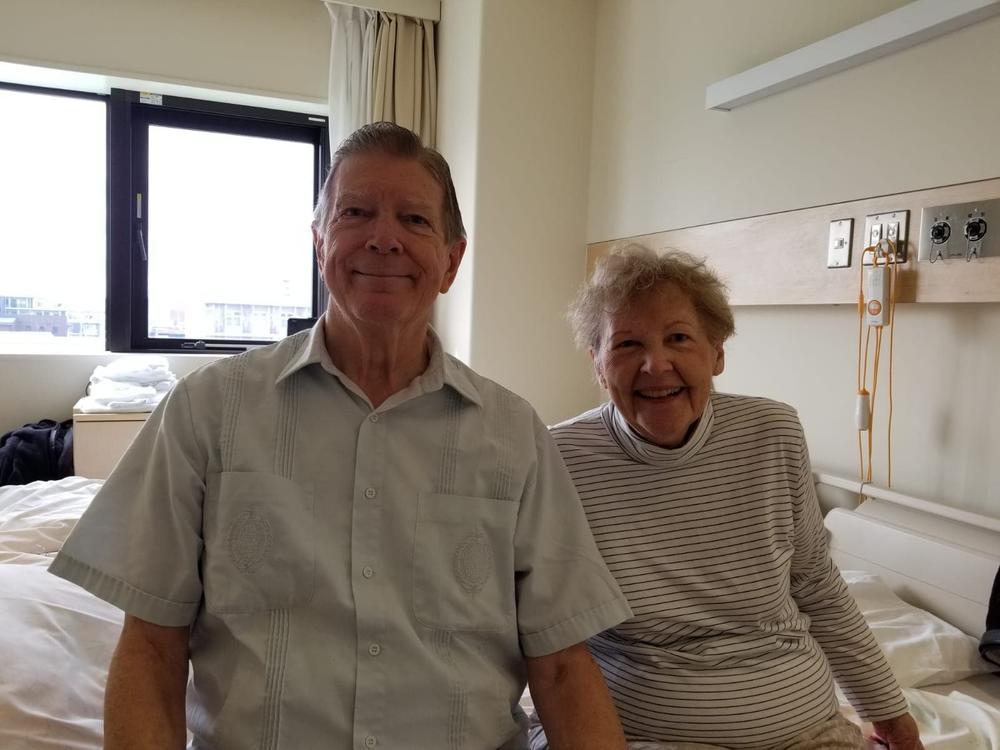
Caption
Clyde and Renee Smith contracted COVID-19 while on a cruise in February 2020. They spent three weeks in a Japanese hospital room before returning to their Atlanta area home.
Credit: Family photo
LISTEN: March 2024 marks four years since Georgia confirmed its first case of COVID-19. But for an Atlanta couple, the virus impacted them much sooner. GPB’s Ellen Eldridge has more.

Clyde and Renee Smith contracted COVID-19 while on a cruise in February 2020. They spent three weeks in a Japanese hospital room before returning to their Atlanta area home.
While COVID-19 is now endemic and accepted, no one knew what to expect when a novel coronavirus began spreading in early 2020.
In February 2020, Renee and Clyde Smith were celebrating their wedding anniversary with an international vacation that left them stranded off the coast of Japan aboard the Diamond Princess cruise.
The Diamond Princess left Yokohama for a 15-day cruise on Jan. 20, 2020. One man from Hong Kong left the ship when it docked there five days later, and checked into a hospital.
“Feb. 4 is when they found out that a man who had disembarked at Hong Kong actually had been diagnosed with the virus,” Renee Smith said. “So, they told our captain that no one could leave the ship.”
As Americans watched Wuhan, China, with worry and fear, the 80-year-old couple tested positive for the novel coronavirus with no knowledge of what that might mean. Though both remained asymptomatic, the Smiths were forced to quarantine in Japan. They were some of the first to contract COVID-19.
The virus causing COVID-19 had not even been named yet.
It took another week before the International Committee on Taxonomy of Viruses (ICTV) chose "severe acute respiratory syndrome coronavirus 2 (SARS-CoV-2)" because the virus is genetically related to the coronavirus responsible for the SARS outbreak of 2003.
Viruses are named based on their genetic structure to facilitate the development of diagnostic tests, vaccines and medicines. Virologists and the wider scientific community do this work, so viruses are named by the ICTV.
While they were in the Japanese hospital, a friend told them new virus was like influenza, though Clyde Smith said he and his wife never even felt flu-like symptoms.
A CT scan showed pneumonia in his lungs, but he never felt short of breath. He said he wouldn’t have even known about the pneumonia without that scan.
Staff treated them well and the expense of the care was taken care of, too.
"The real miracle of our time in Japan was the Japanese government paid every penny: They covered the entire cost," Clyde Smith said, again, in March 2024. "And that wouldn't happen here. If we were here in a hospital for three-and-a-half weeks as we were there, we'd have been wiped out financially."
The room in Tachikawa Hospital was tiny, but had a gorgeous view of Mt. Fuji. Clyde Smith said it was the newest, most modern and fanciest hospital he ever stayed at.
"The beds were absolutely wonderful," Renee Smith said. "They were firm and nice and they had the best pillows I've ever slept on. There were kind of like beanbag head pillows. They were so comfortable, though."
Former President Donald Trump did not want infected Americans to return home, and was furious with senior advisers over their decision to allow 14 Americans, including the Smiths, who tested positive for coronavirus to return to the United States from Japan. Officials assured that infected patients would remain in quarantine overseas.
As people began panic buying and hoarding supplies, the Smiths enrolled in an Emory study looking at antibody levels.
They've continued to participate in studies through Emory University's Hope Clinic.
"We've been donating a lot of blood," Clyde Smith said. "They'll take six or eight tubes of blood from us each time we go, about every three months, to study our reaction to the vaccine and to the episode Renee had and see how the antibodies are holding out."
Renee Smith did contract COVID-19 again, and this time she fell very ill.
"Oh, I did about a year and a half ago, maybe even longer than that," she said. "It was during the summer and Paxlovid saved me. I never did go to the hospital or anything. I was very, very sick."
The prescription medicine Paxlovid is used to treat mild-to-moderate COVID in adults who are at high risk for severe symptoms, including hospitalization or death.
It's not approved for use as pre-exposure or post-exposure treatment for prevention of the disease.
The Smiths said they’ve kept up with every update of the COVID vaccine — and currently have sore arms after getting a booster shot this week.
The now-84-year-old couple also keeps up with the Japanese nurses who cared for them, one of whom got married and had a baby after they left.
"She first sent us a picture of the baby about a year and a half ago; so cute." Renee Smith said. "But, yesterday I guess it was, she sent us a picture of that same child who's now 2 years old."
They aren't deterred by their experiences, and plan to travel to England later this year.
"We have some grandchildren there, and we're going to go see the twins, who just turned 14, get confirmed," Renee Smith said. "And this will be the third time we've seen them, because England is a long way away."
It will be the first trip outside the United States for the couple since 2020.